Our last day in Tsavo West.We break camp and pack the tents. Gabriel steps by and asks us to sign the camp register. I notice very few people stay more than one night, although one group stayed four. Lucky bastards.
We load the car, and Gabriel mentioned a cave near the lava, so we decide to take a look there. We are not allowed to leave the car, because of leopards.
We start driving and find a sign for the caves, and immediately the road turns very bad. Big stones, rocks, steep parts, Kari has a full-time job behind the wheel.
We pass a sign post without signs, and the path winds higher up the strange looking mountains. Some look completely conical with stripes of green vegetation from the top down.
After a while the road starts to pass steep abysses, and we decide to turn back. The indicated distance of six kilometers to the cave is greatly exceeded.
For several hours we follow another game circuit, without much luck.
Then, for a last time we go to our favorite spot Rhino valley, and spend most of the afternoon watching game.
Seeing giraffes run is quite a spectacle. It seems their movement is in slow motion. The movements of the long limbs is slow, but the effect is that the giraffe seems to float through the air.
Giraffes are interesting anyway. When they drink, the blood pressure in their brain would become dangerously high (long neck pointed down), therefore they have a system of additional veins in their head, to temporarily accommodate the extra blood.
They also have a very high blood pressure to get the blood to their head. And just like any other mamal, they have seven (or six, what is it again?) neck vertebrae.
We enjoy ourselves until time compels us to start moving east, to the Tsavo gate.
That road is quite long, and around four o'clock we pass the rhino sanctuary - which opens only two hours per day, from 4 to 6pm.
In spite of the time pressure we decide to spend half an hour scouting for rhinos. Only one other car is there: a guide with a fat Bulgarian man, equipped with a camera with a lense longer than a gun.
We baptize him the 'Bulgarian King'.
For 45 minutes we cruise through the sanctuary, but unfortunately we find no rhino.
By the way, this sanctuary started in the mid 90's with 25 rhinos. The growth rate was more than 7%, so it roughly doubled every ten years. And indeed in 2006 there were 65 rhinos. Unfortunately there the data stops. By now they could have 125 rhinos.
Then again, if you realize that the world in the 1970’s had some 40.000 rhinos, and that because of rich impotent Chinese men the population decreased to about 3000 in the early 90's, we still have a long way to go.
Since we are delayed, and have to leave the park at 17:45, we really have to step on it, and Didi does the best he can over the horrible roads. There is no time to watch nature or to talk, because everything rattles and shakes. After an hour we reach the exit gate, 15 minutes before we would have to pay another day.
But then the guard tells us that the entrance gate to Tsavo East closes at 6pm. He recommends to enter through the closest gate, even if that means driving for two hours over a bad road inside the park to our campground.
If we take the Mombasa Nairobi highway to the Voi gate, we will surely find it closed.
We take the Mombasa Nairobi highway for 10 kilometers and find the Manyani gate, where they are reluctant to let us in so close to closing time.
We are tired and give it our best, and they let us in.
'We are human,' the big guard with a gun tells us, 'and a tip helps too.'
Then starts a race against the clock, because the road is bad. And I can tell you, dear reader, that driving at night over a bad African road, is a special experience.
The limited view of the headlights reveals never ending potholes, big enough to break the wheels, rain gullies deep enough to get stuck, endless sharp stones pointed upwards, and endless sharp ridges that shake the car so badly, that occasionally the gear is shifted to neutral.
Halfway a beautiful full moon rose over the mountains.
And finally we reached an elephant gate with electric wires hanging down.
Then it was fifteen minutes more until we reached Ndololo campsite, and we could finally pitch the tents.
An enormous row of elephants keeps walking by, on it's way to a water hole next to the campsite. They regularly trumpet or growl with an intensely deep gurgling sound.
I always hoped to find Africa, and here I certainly found it.

 Tsavo East National Park, Makueni County, Kenya
Tsavo East National Park, Makueni County, Kenya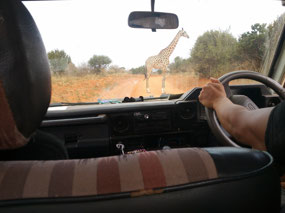
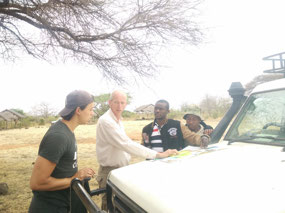
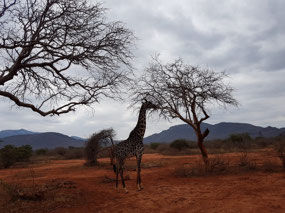
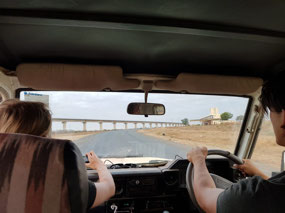





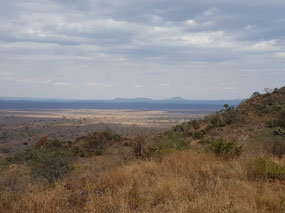
2025-05-23